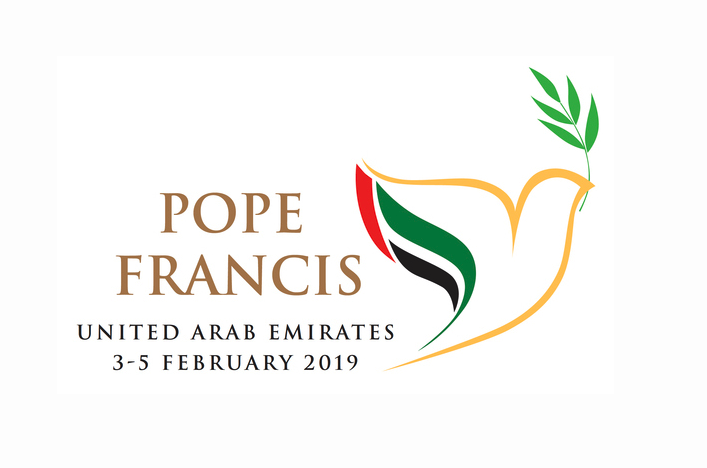Pope Francis to Make Historic Visit to Abu Dhabi
During the Feb. 3-5 trip, the first by a pontiff to the Arab Peninsula, the Holy Father will attend an interfaith meeting and celebrate a Mass for the country’s large immigrant Catholic population.

Pope Francis will be breaking new ground when he becomes the first pontiff to set foot in the Arab Peninsula and visits the second most populous city in the United Arab Emirates Feb. 3-5.
The papal visit, primarily to attend an “International Interfaith Meeting” that will be taking place on the theme “Human Fraternity,” comes after invitations from Sheikh Mohammed bin Zayed Al Nahyan, Abu Dhabi’s crown prince, and from the Catholic Church in the UAE, the Vatican said in a Dec. 6 statement.
Holy See Press Office Director Greg Burke said the Church’s theme for the visit — to “Make Me a Channel of Your Peace” — is the “Pope’s intention in going to the Arab country,” adding that how all people of goodwill can work for peace “will be a major topic on this trip.”
Burke said the apostolic voyage would be similar to his visit to Egypt in April 2017 in showing “the fundamental importance the Holy Father gives to inter-religious dialogue.” He added that Pope Francis’ visit to the Arab world would be “a perfect example of the culture of encounter.”
The visit to the oil-rich emirate will be a brief one: arriving in the evening of Sunday, February 3, and leaving midday on Tuesday, February 5, with a public Mass in Abu Dhabi scheduled for the final day.

According to UAE government figures, around one million Christians of various denominations live in the emirates out of the total population of 9.5 million, and 70%-75% of them are believed to be Catholics.
Bishop Paul Hinder of the Apostolic Vicariate of Southern Arabia, which comprises the UAE, Oman and Yemen, expressed his “gratitude” to the UAE government for inviting the Pope. In a Dec. 6 statement, he said a “special team” would be working “closely” with the UAE authorities to ensure the visit runs as smoothly as possible.
He also said he appreciated the UAE government’s generosity in allowing the Mass to be celebrated, which is expected to draw an enormous number of faithful. “These are warm and kind gestures that we appreciate and acknowledge,” he said. Noting its historic nature, Bishop Hinder predicted the “short visit will be momentous for all, and especially for the Bishop of Rome.”
The Swiss bishop also said he hoped it would mark “an important step in the dialogue between Muslims and Christians and contribute to mutual understanding and peace-making in the Middle East.”
Abu Dhabi Wins
The visit comes after years of regional leaders vying for the Pope to visit the region, a reflection some Middle East observers say of the growing religious tolerance in the Gulf states, and a seeming contest among national leaders to show who is the most tolerant.
The UAE, which formed diplomatic ties with the Holy See during Benedict XVI’s pontificate in 2007, has been particularly committed to such a visit. The country’s former Minister for Tolerance, Sheikha Lubna Al Qasimi, issued an invitation when she visited the Vatican in 2016, as did Sheikh Mohammed bin Zayed when Pope Francis received him in private audience in September that year, leading to speculation at the time that a visit would take place.
The crown prince said on Twitter he was “delighted” by today’s news while Sheikh Mohammed bin Rashid, vice president and ruler of Dubai, said he hoped the visit would “strengthen our ties and understanding of each other.”
The UAE is delighted to welcome His Holiness Pope Francis on the upcoming visit to the UAE. He is a symbol of peace, tolerance and the promotion of brotherhood. We look forward to a historic visit, through which we will seek dialogue on the peaceful coexistence among peoples. pic.twitter.com/xdsmU18HpO
— محمد بن زايد (@MohamedBinZayed) December 6, 2018
Christianity has been present in the southern Arabian Gulf since the 6th Century, soon followed by the arrival of Islam in the year 630. Evidence of the long Christian presence was discovered recently when a Christian monastery from the seventh or eighth century was unearthed in the country (Sheikh Mohammed bin Zayed presented Pope Francis with a special collection of photographs of the discovery in 2016).
But as Islam took root in southeastern Arabia, so the local population ceased to be Christian. Since then, the UAE’s connection with Christianity has been dependent on Christian immigrants, often arriving through trade links and oil.
Few churches in the region have meant large Catholic parishes, and a local clergy that struggles to cope with the numbers (St. Mary’s parish in Dubai, for example, has a congregation of many thousands and Masses almost around the clock). But the UAE’s rulers have steadily tried to be more accommodating, and more churches are being built every year, serving a wide variety of denominations.
The Vatican has welcomed these efforts while at the same time encouraged the UAE’s commitment to eradicate extremist, Islamist violence, through the emirates’ active cooperation with various initiatives.
But it’s the UAE’s large immigrant Catholic and Christian population that will be most enthusiastic about the news, having long wished for a pope to visit the region.
“It has been the hope of all Catholics in the UAE that the Holy Father would visit us here,” Father Ani Xavier, parish priest of St Paul’s Church in Mussaffah, told The National Dec. 6. “We have been praying for it.”
- Keywords:
- abu dhabi
- arabia
- dubai
- pope francis
- united arab emirates


















